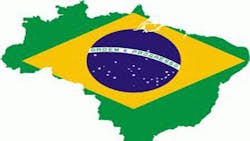Competing with China for Interest in Africa, Brazil Cancels Debt
BRASILIA -- Brazil's move to cancel or restructure $900 million worth of debt from 12 African countries is a further sign of its growing strategic interest in a booming region where it is competing for influence with China.
President Dilma Rousseff announced the decision Saturday in Addis Ababa where she attended African Union celebrations to mark 50 years of the continental bloc.
It was her third trip in three months to Africa, a continent with which Brazil has close cultural and economic affinities.
"Brazil is fully aware that Africa is the last frontier of the global economy, where we will see high growth rates in the next decades," said Oliver Stuenkel, a professor of international relations at the Getulio Vargas Foundation.
"This reflects an economic but also political interest: There are 54 African countries in the United Nations, where Brazil is seeking a permanent seat in the Security Council, and they recently helped elect a Brazilian as head of the World Trade Organization," he pointed out.
Rousseff stressed that the debt cancelation was part of Brasilia's efforts to boost economic ties with Africa, home to some of the world's fastest growing economies.
Among the 12 countries whose debts were canceled, Congo-Brazzaville was the highest with a $352 million debt cancelled, with Tanzania's $237 million debt the second largest.
Rousseff noted that Brazil was also setting up an agency to support investments in industry and development in Africa and Latin America.
This country, which has the world's second largest black population after Nigeria, enjoys very close cultural and historical ties with Portuguese-speaking African countries such as Angola, Mozambique, Guinea-Bissau and Cape Verde.
And its interest in Africa is part of a larger trend boosting so-called South-South cooperation.
With a population of nearly 200 million people, this South American giant is one of five members of the BRICS bloc of emerging powers along with China, India, Russia and South Africa.
With a GDP of $2.425 trillion in 2012, Brazil is the world's seventh largest economy and is forecast to grow 3.5% this year.
Rousseff is continuing a policy launched by her predecessor Luis Inacio Lula da Silva, who made Africa a priority in Brasilia's foreign policy.
"We are indebted to Africa," Lula told business and political leaders at the Economist Summit in Nigeria last March, highlighting the historic ties between Africa and Brazil, where more than half of the population has African roots.
And Nigerian President Goodluck Jonathan cited Brazil as a model for what he termed his drive to curb poverty in Africa's most populous country and top oil producer.
Brazil's trade with Africa jumped from $5 billion in 2002 to $26.5 billion in 2012 and Brasilia now has 37 embassies on the continent.
Brazilian mining giant Vale, the world's biggest iron ore producer, has investments of $7.7 billion in nine African countries while the state-owned BNDES development bank has allocated 682 million dollars in 2012 for Brazilian companies operating in Africa, 46 percent more than in 2011.
Brazil's state-owned oil company Petrobras has also invested hundreds of millions of dollars in Nigeria's coal, oil, natural gas and alternative energy sectors.
Although Brazil's presence in Africa is relatively small compared with that of deep-pocketed China, its projects fit well with the continent's current economic development, particularly technical cooperation in the farming sector, food security, biofuel production and social programs to eradicate poverty.
Brazil is notably sharing its broad expertise in tropical agriculture, which has helped it become one of the world's leading food exporters.
"In the past decade, Brazil had become a major player on the continent, competing with China and India for influence" although as a resource-rich country itself, it is less interested in African natural resources and more in a "promising market for its goods and services," said a report released by Britain's Chatham House Royal Institute of International Affairs.
It noted that Brazil's involvement in Africa should not be seen as a "purely economic strategy" but as a reflection of its ambition to be recognized as a "main player" on the international scene.
-Yana Marull, AFP
Copyright Agence France-Presse, 2013
About the Author
Agence France-Presse
Copyright Agence France-Presse, 2002-2025. AFP text, photos, graphics and logos shall not be reproduced, published, broadcast, rewritten for broadcast or publication or redistributed directly or indirectly in any medium. AFP shall not be held liable for any delays, inaccuracies, errors or omissions in any AFP content, or for any actions taken in consequence.
